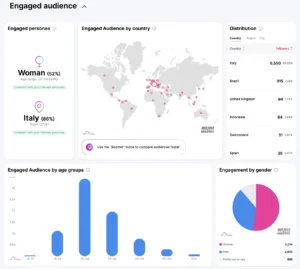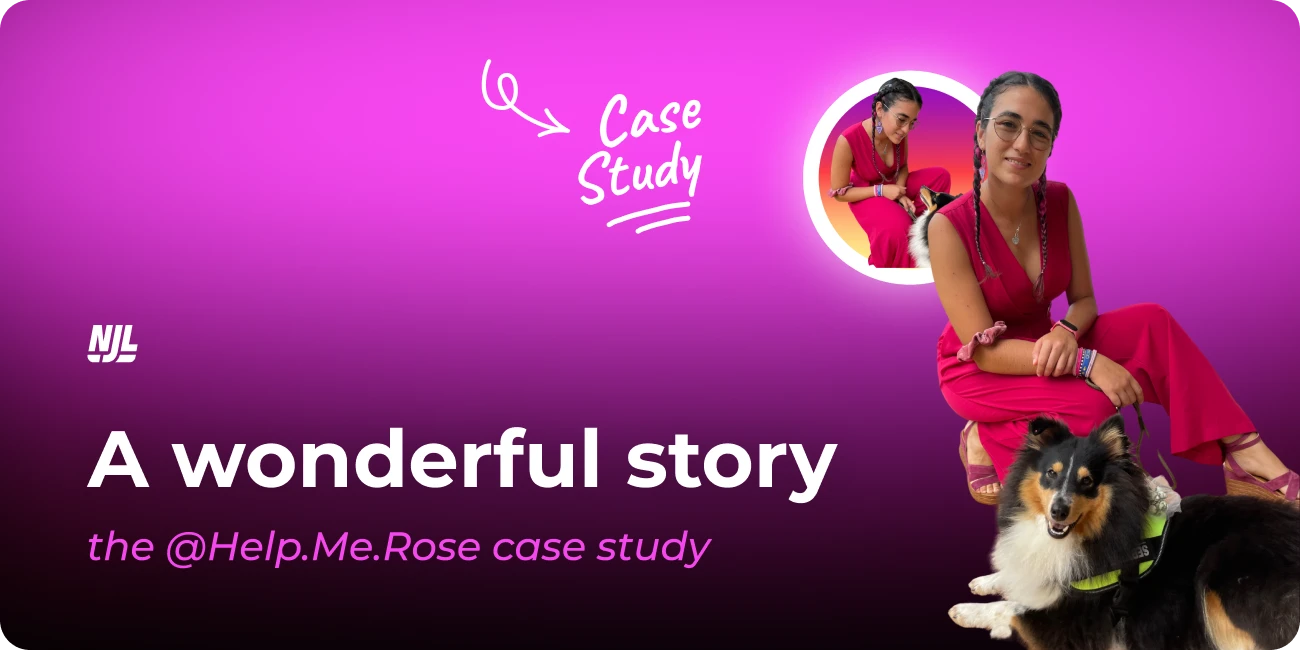“Ugh, social media is just full of cxxp!” If you’ve heard this phrase a trillion times and it’s always sounded a bit empty to you, then this article is for you. And if you actually believe that those who say this know what they’re talking about – stick around: you might be surprised.
At first glance, this cliché seems to pretty accurately describe reality. But thankfully, there’s always an exception to the rule, and that’s what we want to talk to you about.
Her name is Sophie Bertocchi, and 164 posts ago started sharing a story where the main character – a girl living with borderline personality disorder – and her dog Rose fight the three-headed monster of depression through content aimed at raising awareness and spreading understanding.
Oh, and this isn’t a fictional story.
Oh, and as it happens, Rose is the first and only psychiatric service dog certified by Assistance Dog International in Italy.
Oh yes, Rose is a dog.
Oh – and this is the last one, we promise – by diving into this story, you’ll discover how we at Not Just Analytics also found ourselves, in our own small way, accompanying Sophie and Rose on this incredible journey.
But before we continue, let’s get straight to the point. Here are three reasons why you should dive into this short read. Stick around if you want to learn:
- That data should be interpreted out of the box, because they hide unexpected opportunities
- How to handle trolls and come out looking like a champ
- How to trust people and the power of their stories, because sharing is the true gold of the web
Enjoy the read!
Hi, I’m Sophie, and this is my friend Rose
Some stories don’t make noise. But we like the other kind – the loud ones, the ones that, you know, make themselves heard. Help Me Rose is Sophie’s answer: a POV-style account of mental health that surprises us not because it’s flashy, but because of its disarming power in spreading trust and hope in this stormy social media algorithm.

So, who is Sophie? She’s a 27-year-old biomedical engineering student who lives with borderline personality disorder. As many of you may already know, she started sharing online all the help that Rose provides to face her depressive episodes. Rose, and you probably already figured this out, is the first and only psychiatric service dog certified in Italy.
Pause! Maybe you’ve heard of emotional support animals, but Rose is way more than that. ESAs (short for Emotional Support Animal) help people simply by being there. But psychiatric service dogs, like Rose, are trained to perform very specific skills. They’re basically highly skilled helpers!
Rose brings medication to Sophie, is trained to recognize signs of a crisis, and does whatever she can to reduce its impact. She has many other tasks as a psychiatric service dog. And lately, she’s even found a bit of time to be a social media star.
Just check out this video where she gives a paw to the entire NJL community.
Sophie’s (Social Media) challenge
While Sophie continued her journey of raising awareness, she discovered that a good social media strategy also needs practical tools to improve its effectiveness. It may seem strange right now switching to numbers, strategy and marketing… but it makes sense. From the outside, Help Me Rose looks like a successful project, but it’s the result of lessons learned through hard work, solid content and a fair share of trial and error.
We said it: social media isn’t exactly Sophie’s natural habitat. Yet, even without a perfectly timed strategy, her efforts have gained well-deserved visibility. In one word: impact. To paint the picture, Sophie and Rose’s story has been featured on TV, on the radio and a book will soon be published.
Is it mixing sacred and profane if we suggest that the story of Sophie and Rose exemplifies differentiation? “Go beyond social media!” – you can almost hear it.
Beyond social media as just media containers, beyond the boundaries of digital space and beyond the restrictive rules that seem to have trapped social media. The success of Sophie and Rose hits right in that area of the human body that philosophers have debated for centuries: the ❤️
In an era ravaged by incomprehensible algorithms, it’s simplicity that cuts through. The kind of simplicity that, in a content strategy, means raising awareness and sharing knowledge. Themes that have become the fil rouge of Sophie’s commitment, the heart of her thesis at Tu Delft University in the Netherlands, and the foundation of a future (not too far off) project to bring pet therapy, as she herself says, “to those hospitals that saved me, to bring joy to patients!”
How to fight the dark side of the web
Of course, it’s not all sunshine and roses – even awareness campaigns have to deal with their shadows, which often take the form of trolls. Yet on more than one occasion, Sophie – and maybe even Rose, if she’s sensed a great approach to community management – has proven to be an excellent example to follow when deciding to open up on social media and (rightfully) break down barriers.

For a deeper understanding of how to handle criticism, we recommend checking out this post we created some timeago with Veronica Civiero. For now, we’ll just highlight three successful elements:
- Sophie’s calm tone immediately diffuses any aggression, indirectly encouraging her community to adopt the same level of discourse
- She clarifies her position without denying or discrediting negative comments
- She flips the situation, offering criticism a positive perspective, which you can read in the caption. We translate it for you: “Let’s not label, let’s not isolate, and let’s fight these sterile stereotypes about mental health together, because it concerns us all.”
Is it all a savvy strategy? Who cares! The success of Help Me Rose comes from one perfect decision after another. Basically, a communication strategy where it’s hard to find flaws. And –pardon our burst of pride – we’ve also played our part. Let us explain how.
How Sophie uses NJL to improve her strategy’s effectiveness
Sophie reveals she found us through good old-fashioned word of mouth. By the way, could you tell us the name of your friend who introduced us? We’d love to give them a big hug.
We’re completely in love with her reason for using NJL day after day:
It gives me peace of mind! It makes me feel in control.
To better break down this love letter, our platform:
- helps her plan her content
- calms her down amidst all the things she has to do (and there are many)
- is ideal for reframing (and putting into context) negative results
- provides her with new ideas and inspiration
We do feel the love for our friendly little tool!
The power of normalizing the numbers
Thanks to the Post Analysis feature, the algorithm phase analysis, and the suggestions for the best times to post, Sophie’s workflow has become faster and she has one less thing to worry about. Even when faced with drops in reach that seem to happen now and then – numbers that could be a morale buster – she says: “with NJL, I know when it’s normal to see such results, and that reassures me.”
That said, having lots of data at your fingertips without putting in the effort to understand them doesn’t really help. Sometimes, as we mentioned at the beggining of this post, you need to go beyond the first thing that comes to mind, activate lateral thinking, and let the data tell you something.
The hidden opportunities in data
We’re not talking about ancient oracles here… we’re talking about something very specific that happened to Sophie. One day, she ended up in the Audience Analysis section – which you can explore too – and discovered that a large portion of her followers live in Rome.

Many might’ve taken this data lightly, but Sophie had an idea: this information would be super useful for organizing the promotion of her upcoming book, right in Rome! Because, in case you haven’t noticed, online and offline get along much better than you’d think.
What Does This Story Teach Us?
The idea that Sophie’s voice and Rose’s paws can make themselves heard loud and clear gives us hope. It means that communicating on social media can still play a role in improving lives, helping us learn about what we don’t know, and giving us all a chance to grow together.
Her work in raising awareness is straightforward, honest, and sometimes challenging—because if we’ve learned one thing, it’s that depression is still too often seen as a taboo.
But it’s right to talk about it, it’s good to talk about it, and it’s wonderful when Sophie and her Rose do it with all their spontaneity.
